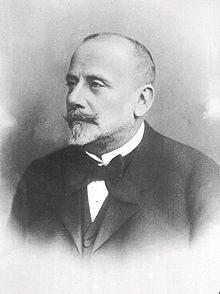Eugene Coupienne
Eugen Friedrich Emil Hermann Louis Coupienne (born March 2, 1843 in Mülheim an der Ruhr ; † August 15, 1907 there ) was a German leather manufacturer and an official in the leather industry.
Live and act
Eugen Friedrich Emil Hermann Louis Coupienne was born as the eldest son of the leather manufacturer Heinrich Coupienne (1810–1889) and his wife Adeline von Eicken (1812–1878). After passing the school leaving examination (1862) at the grammar school in Mülheim an der Ruhr, he trained in his father's leather factory in order to then deepen his knowledge in Belgium, France and England. In 1869 he became a partner in his father's company, H. Coupienne, and in 1889 - after the death of his father and the departure of his brother Jean Baptiste - sole owner.
He promoted technical innovations and implemented them in his factories at an early stage. In 1871 he acquired the first steam engine for his company , in 1874 the first machine for exposing harness leather and machine strap leather, and in 1876 the first splitting machine.
His experience as a leather manufacturer convinced him of the need for an interest group in the tannery industry, where many still working tanners suffered from advancing industrialization and mechanization. In 1881 he initiated the establishment of the Lower Rhine Leather Industry Association based in Mülheim an der Ruhr . This association became part of the stock exchange association of the skin, fur and leather industry for Rhineland and Westphalia in 1888. In 1891, Coupienne founded the Central Association of the German Leather Industry, based in Frankfurt am Main. Until his death in 1907, he chaired both professional associations and represented the interests of the German leather industry with great commitment.
In addition, he served on the board of the leather industry trade association , a member of the Professional Commission in the Prussian district government in Dusseldorf as well as a city councilor (from 1890) and an unpaid Assistant (1899) in his hometown of Mülheim an der Ruhr. Just like his grandfather Jean Baptiste , he held the Prussian honorary title of " Kommerzienrat ". From 1889 until his death he was a member of the Masonic lodge Broich Zur Transfigured Luise , from 1900 he held the office of master of the chair there . He was also a member of the Mülheimer Bürgergesellschaft Casinogesellschaft , where he served on the board.
The former Villa Eugen Coupienne with a centuries-old garden in Mülheim an der Ruhr at Friedrichstrasse 40 has been home to a hospice since 2012 .
Marriage and children
In 1869 he married Marie Cornelie Fischer (1846–1939). They had four children together:
- Ernst (1870–1945), from 1895 partner of the H. Coupienne company
- Mathilde (* 1874) ∞ Louis Michels
- Jean baptiste jr. (1877–1938), from 1904 partner of the company H. Coupienne, owner of Haus Urge - in the vernacular of Mülheim the abbreviation URGE stands for "Our wealth allows it"
- Adeline (* 1879)
literature
- Peter Durniok: Coupienne, Eugen. In: New German Biography (NDB). Volume 3, Duncker & Humblot, Berlin 1957, ISBN 3-428-00184-2 , p. 382 f. ( Digitized version ).
- Ilse Barleben : Mülheim ad Ruhr. Contributions to its history from the city elevation to the founding years. Mülheim an der Ruhr 1959, pp. 391-403.
- Thomas Urban: Immigrants with new ideas: The Coupienne family and the Mülheim leather trade. In: Horst A. Wessel (ed.): Mülheim entrepreneurs: pioneers of the economy. Business history in the city on the river since the end of the 18th century . Klartext Verlag, Essen 2006, pp. 79–87.
Individual evidence
- ↑ History of the Lodge , Homepage: Freemason Lodge Broich No. 327 (accessed on April 27, 2013)
Other sources
- City archive Mülheim an der Ruhr, holdings 1390/2/15 (Chronicle of the Coupienne family. Compiled by Ernst Coupienne, 1921.)
Web links
| personal data | |
|---|---|
| SURNAME | Coupienne, Eugene |
| ALTERNATIVE NAMES | Coupienne, Eugen Friedrich Emil Hermann Louis (full name) |
| BRIEF DESCRIPTION | German leather manufacturer and association official in the leather industry |
| DATE OF BIRTH | March 2, 1843 |
| PLACE OF BIRTH | Mülheim an der Ruhr |
| DATE OF DEATH | August 15, 1907 |
| Place of death | Mülheim an der Ruhr |
